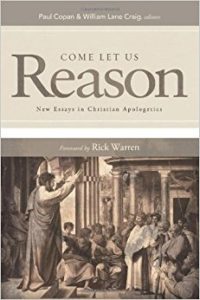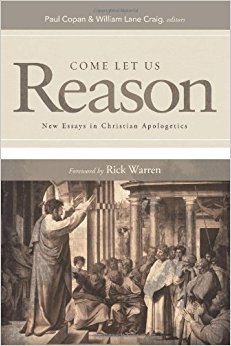 By: Brian Chilton | November 26, 2017
By: Brian Chilton | November 26, 2017
Copan, Paul, and William Lane Craig, eds. Come Let Us Reason: New Essays in Christian Apologetics. Nashville: B&H Academic, 2012. $24.99. 324 pages. ISBN: 978-1-4336-7220-0.
Nashville: B&H Academic, 2012. $24.99. 324 pages. ISBN: 978-1-4336-7220-0.
Summary
Come Let Us Reason is a collection of essays written by several prominent apologetic scholars who have made an impact in various fields. Come Let Us Reason, co-edited by Paul Copan and William Lane Craig (giants in their own right), serves as a compendium of resources which will help the Christian to defend his or her faith.
The book is comprised of five sections. The first section discusses the impact of apologetics in the modern culture. The first chapter penned by Gregory E. Ganssle discusses the means by which the gospel connects to society. Ganssle has titled the article “Making the Gospel Connection: An Essay Concerning Applied Apologetics.” Ganssle’s article does two things: discusses the nature of apologetics, showing that it is the responsibility of all believers; and he explains some of the tools that helps one understand the calling (Copan & Craig, CLUR, 3). The Diagnostic and Engel Scales are most helpful. J. P. Moreland also contributes to this section, writing about the four degrees of postmodernism; which he defines as “ontic, alethic, epistemic, and axiological/religious” (Copan & Craig, CLUR, 17). Toni Allen contributes a piece describing the woman’s role in apologetics. In my humble opinion, I think that women need to stop writing about women doing apologetics and just simply do it. No disrespect to Allen intended. Mary Jo Sharp, also a contributor of the book, does just that. My advice for female apologists would be to become the best apologist you can become and serve as an example for other aspiring female apologists.
The second section discusses the existence of God and issues surrounding theology proper. William Lane Craig begins the section by discussing some of the most absurd objections he has encountered to the kalam cosmological argument. The essay is laid out in a top-10 format. The next chapter is well worth the price of the book alone. Liberty professor and resurrection expert, Gary Habermas writes on the silence of God. While the chapter is brief (only 13 pages long), the conclusion is powerful! It is so powerful that you must read it for yourself. I’ll leave you with this—the silence of God is not what you think it is. Robert B. Stewart continues the section with a piece that describes the problem of naturalism by evaluating the worldview by five criteria: “1) coherence, 2) correlation, 3) comprehensiveness, 4) consistency, and 5) commitment” (Copan & Craig, CLUR, 81). Stewart finds that naturalism fails in all five categories.
The third section discusses the historicity of Jesus and the reliability of the New Testament. Craig S. Keener begins the section by discussing the historical reliability of the Gospels, arguing that the Gospels fit well within the scope of ancient biographies and are quite reliable when one considers the level of skill that ancients had in memorizing material and even writing some things down. E. Randolph Richards then defends the authenticity of the Pauline letters by describing the approach that amanuenses played in writing letters for individuals of antiquity. The ancient writing style was much different as there were co-writers of letters: the author and the secretary(ies) involved in the process. This explains the apparent differences that critical scholars claim exists in the various letters of Paul. Michael Licona then defends the resurrection of Jesus against Bart Ehrman’s red herrings. Mary Jo Sharp then defends the story of Jesus against the claim that it was a fictionalized adaptation of pagan myths. Mark W. Foreman closes the section as he challenges that “parallelomania” of the Zeitgeist movie.
The fourth section discusses ancient Israel’s religion compared to other ancient religions. Richard S. Hess argues that the Israelites did not claim Yahweh to have a wife as some critics postulate. Matthew Flannagan discusses the controversial command of God to commit genocide, or at least as some claim God does, arguing that the terminology is hyperbolic (Copan & Craig, eds, CLUR, 248) and not necessarily literal. Paul Copan then describes the slavery practices of antiquity and shows that it is not the same as the practices of the American antebellum period. Copan argues that the practice was a work debt-servanthood practice in which the worker was released every seven years.
The fifth and final section discusses the uniqueness of Christianity as compared to other world religions. Michael H. Edens discusses the origins and apparent discrepancies of the Qur’an. Barbara Pemberton ends the section and the book arguing that modern inclusive movements look amazingly similar to Hinduism.
Strengths/Weaknesses
Come Let Us Reason is well organized and well-written. The book covers some of the more major objections modern Christians encounter. I thought the top-7 chapters of the book were Habermas’s piece on the silence of God, Keener’s chapter on the Gospels’ reliability, Richard’s essay on Greco-Roman letter writing, Licona’s paper on Ehrman’s red herrings, Copan’s chapter on Old Testament slavery, Stewart’s critique of naturalism, and Sharp’s defense for the uniqueness of Christianity.
While most of the chapters were solid, a few were not as strong. I was not as impressed with Allen’s chapter. While I understand that there needs to be an emphasis on women taking a role in apologetics, I am not so sure this was the appropriate avenue. I was far more impressed with Sharp’s actual practice of apologetics in action. While Hess’s chapter was good, I didn’t get as much out of his piece as I did others. I am not so sure that the charge that Yahweh supposedly had a wife is a major objection that the Christian defender would face. A defense of Judaism’s uniqueness in the ancient near east would have been a better piece for Hess to write and would have fit the overall flow of the book much better.
Benefits
Both the seasoned apologist and the apologetic newbie will benefit from this book. The book covers the major areas that the apologist will need to grasp in order to adequately defend one’s faith.
Rating
I give this book 5 stars all the way.
About the Author
 Brian Chilton is the founder of BellatorChristi.com and is the host of The Bellator Christi Podcast. He received his Master of Divinity in Theology from Liberty University (with high distinction); his Bachelor of Science in Religious Studies and Philosophy from Gardner-Webb University (with honors); and received certification in Christian Apologetics from Biola University. Brian is currently a student of the Ph.D. program in Theology and Apologetics at Liberty University. Brian is full member of the International Society of Christian Apologetics and the Christian Apologetics Alliance. Brian has been in the ministry for over 14 years and serves as the pastor of Huntsville Baptist Church in Yadkinville, North Carolina.
Brian Chilton is the founder of BellatorChristi.com and is the host of The Bellator Christi Podcast. He received his Master of Divinity in Theology from Liberty University (with high distinction); his Bachelor of Science in Religious Studies and Philosophy from Gardner-Webb University (with honors); and received certification in Christian Apologetics from Biola University. Brian is currently a student of the Ph.D. program in Theology and Apologetics at Liberty University. Brian is full member of the International Society of Christian Apologetics and the Christian Apologetics Alliance. Brian has been in the ministry for over 14 years and serves as the pastor of Huntsville Baptist Church in Yadkinville, North Carolina.
© 2017. BellatorChristi.com.





